
Amarashilpi Jakanachari was a legendary Indian sculptor credited with building many fine temples for the Kalyani Chalukyas and Hoysalas.

Suvarna Sundari is a 1957 Indian Telugu-language swashbuckler film, produced by P. Adinarayana Rao under the Anjali Pictures banner and directed by Vedantam Raghavaiah. It stars Akkineni Nageswara Rao, Anjali Devi and music also composed by Adinarayana Rao.

Rahasyam (transl. Secret) is a 1967 Indian Telugu-language swashbuckler film directed by Vedantam Raghavaiah and produced by Allareddy Shankar Reddy under the Lalitha Siva Jyothi Films banner. It stars Akkineni Nageswara Rao, B. Saroja Devi, Kanta Rao, Krishna Kumari, S. V. Ranga Rao and music composed by Ghantasala.
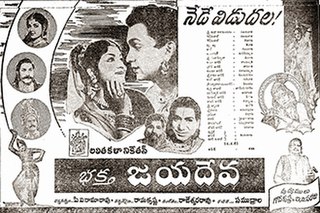
Bhakta Jayadeva is a 1961 Indian Telugu-language biographical film, based on the life of 12th Century Sanskrit Poet Jayadeva, produced by Komaravolu Narayana Rao and G. Paramdhama Reddy under the Lalitha Kala Nikethan banner and directed by P. V. Rama Rao, while Ramakrishna took care of direction supervision. It stars Akkineni Nageswara Rao, Anjali Devi and music composed by Saluri Rajeshwara Rao.

Chenchu Lakshmi is a 1958 Indian bilingual Telugu- and Tamil-language Hindu mythological film, produced and directed by B. A. Subba Rao. It stars Akkineni Nageswara Rao and Anjali Devi, with music composed by S. Rajeswara Rao; both of the movies simultaneously shot in Telugu and Tamil, most of the scenes and artists are same in both the versions, it was also made earlier in 1943 with different cast and crew.

Sri Krishnarjuna Yuddhamu is a 1963 Indian Telugu-language Hindu mythological film, produced and directed by K. V. Reddy under the Jayanthi Pictures banner. It stars N. T. Rama Rao, Akkineni Nageswara Rao and B. Saroja Devi, with music composed by Pendyala Nageswara Rao. It was later dubbed into Kannada and into Tamil.

Kula Gotralu is a 1962 Indian Telugu-language drama film, produced by A. V. Subba Rao under the Prasad Art Pictures banner and directed by K. Pratyagatma. It stars Akkineni Nageswara Rao and Krishna Kumari, with music composed by S. Rajeswara Rao. The film won the National Film Award for Best Feature Film in Telugu certificate of merit in 1963. The Telugu veteran actor Krishna played a sidekick role in the movie before entering into the industry.

Bhale Ramudu is a 1956 Indian Telugu-language drama film, produced by V. L. Narasu and directed by Vedantam Raghavaiah. The film stars Akkineni Nageswara Rao and Savitri, with music composed by S. Rajeswara Rao. It is a remake of the Hindi film Kismet (1943). The film was simultaneously made as the Tamil movie Prema Pasam.

Nammina Bantu is a 1960 Indian Telugu-language drama film produced by Yarlagadda Venkanna Chowdary under Sambhu Films and directed by Adurthi Subba Rao. It stars Akkineni Nageswara Rao and Savitri, with music jointly composed by S. Rajeswara Rao and Master Venu. The film was remade as the Tamil film Pattaliyin Vetri. Both films were made simultaneously under same banner and director, and some of the scenes and artists are the same in both versions. Upon release the film received critical acclaim. The film was screened at the San Sebastián International Film Festival. The film won the National Film Award for Best Feature Film in Telugu.

Aadarsa Kutumbam is a 1969 Indian Telugu-language drama film, produced by A. V. Subba Rao under the Prasad Art Productions banner and directed by K. Pratyagatma. It stars Akkineni Nageswara Rao and Jayalalithaa, with music composed by S. Rajeswara Rao.
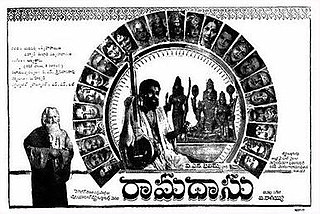
Ramadasu is a 1964 Indian Telugu-language biographical film, based on the life of Kancharla Gopanna, produced and directed by Chittoor V. Nagaiah. It stars Nagaiah, with N. T. Rama Rao, Akkineni Nageswara Rao, Sivaji Ganesan and Anjali Devi in special appearances, with music composed by Ashwathama. The blockbuster film has garnered the National Film Award for Best Feature Film in Telugu, and has garnered several state awards.
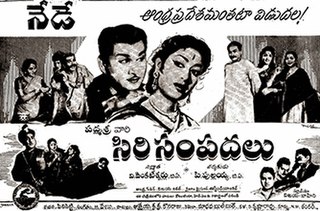
Siri Sampadalu is a 1962 Indian Telugu-language drama film, produced by V. Venkateswarlu and directed by P. Pullaiah. It stars Akkineni Nageswara Rao and Savitri, with music composed by Master Venu.
Amarashilpi Jakanachari is a 1964 Indian Kannada film, directed and produced by B. S. Ranga. It stars Kalyan Kumar as the titular protagonist, in the eponymous role as Amarashilpi Jakanachari, a sculptor who lived in the 12th-century Hoysala Empire. It also features B. Saroja Devi, Udaykumar and V. Nagaiah in the lead roles. The film score and soundtrack were composed by S. Rajeswara Rao. The film was the first Kannada feature film fully shot in color. The director remade the movie in Telugu in the same year as Amara Shilpi Jakkanna.

Pelli Kanuka is a 1960 Indian Telugu-language romantic drama film, produced by and directed by C. V. Sridhar. It stars Akkineni Nageswara Rao, Krishna Kumari and B. Saroja Devi, with music composed by A. M. Rajah. The film is a remake of Sridhar's own Tamil film Kalyana Parisu (1959). It was released on 29 April 1960, and became a commercial success.

Aathma Balam is a 1964 Indian Telugu-language romantic thriller film, produced by V. B. Rajendra Prasad and directed by V. Madhusudhan Rao. It stars Akkineni Nageswara Rao, B. Saroja Devi and Jaggayya, with music composed by K. V. Mahadevan. The film is a Telugu adaptation of the Bengali film Agni Sanskar (1961).

Vasantha Sena is a 1967 Telugu-language historical drama film, produced and directed by B. S. Ranga under the Vikram Studios banner. It stars Akkineni Nageswara Rao, Krishna Kumari and music composed by S. Rajeswara Rao. The film is based on the Sanskrit Stage drama, Mṛcchakatika by Śūdraka of 5th century AD..

Sati Sumathi is a 1967 Telugu-language Hindu mythological film, produced by Chinna Rao under the Chinni Brothers banner, presented by Anjali Devi and directed by Vedantam Raghavaiah. It stars Kanta Rao, Anjali Devi and music composed by P. Adinarayana Rao.

Sati Savitri is 1957 Indian Telugu-language Hindu mythological film, based on the life of Savitri & Satyavan, produced by S. Varalakshmi under the Varalakshmi Pictures banner and directed by K. B. Nagabhushanam. It stars Akkineni Nageswara Rao, S. Varalakshmi, S. V. Ranga Rao and music composed by S. V. Venkatraman.
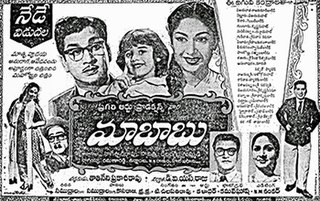
Maa Babu is a 1960 Indian Telugu-language drama film co-written and directed by T. Prakash Rao. The film stars Akkineni Nageswara Rao and Savitri, with music composed by T. Chalapathi Rao. It is a remake of the Hindi film Chirag Kahan Roshni Kahan (1959).
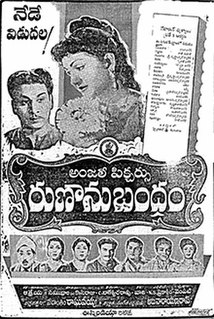
Runanubandham is a 1960 Indian Telugu-language drama film, produced by P. Adinarayana Rao under the Anjali Pictures banner and directed by Vedantam Raghavaiah. It stars Akkineni Nageswara Rao Anjali Devi and music composed by P. Adinarayana Rao. This film had its beginning sequence in Gevacolor.


















